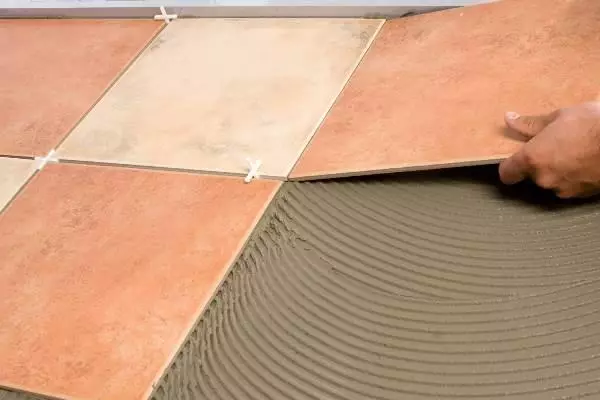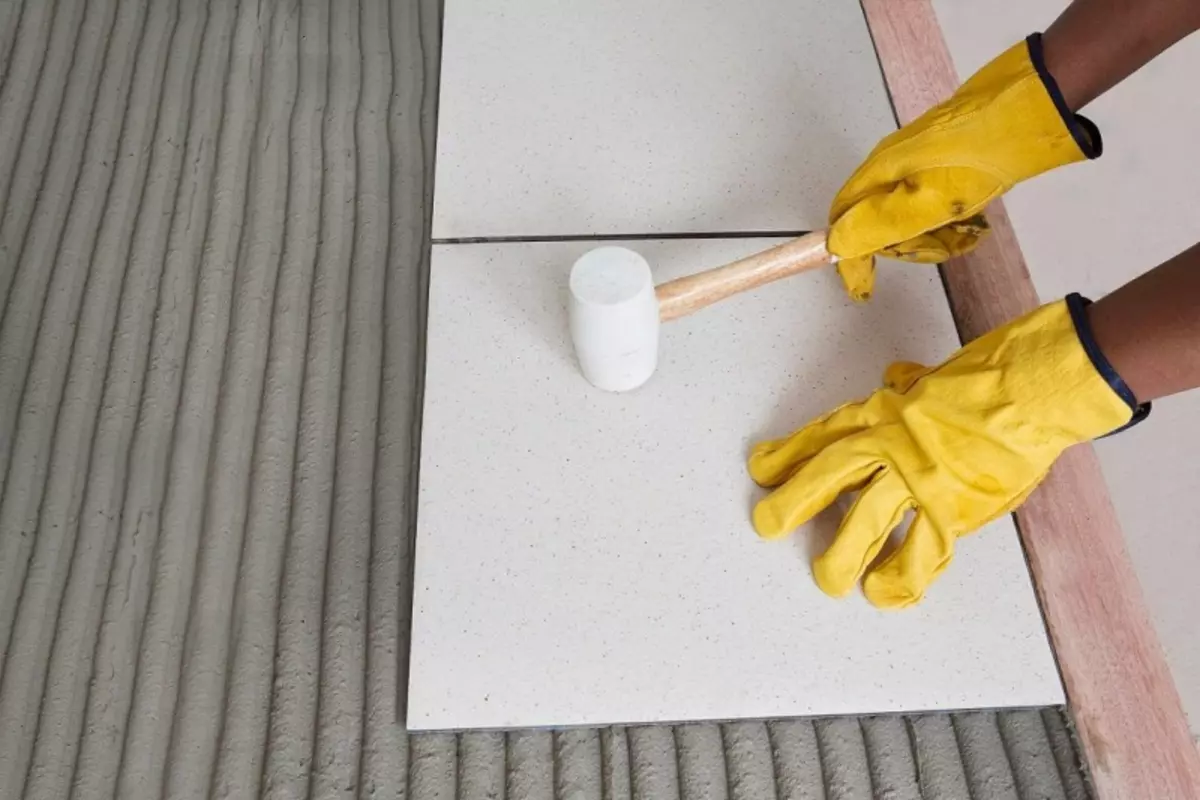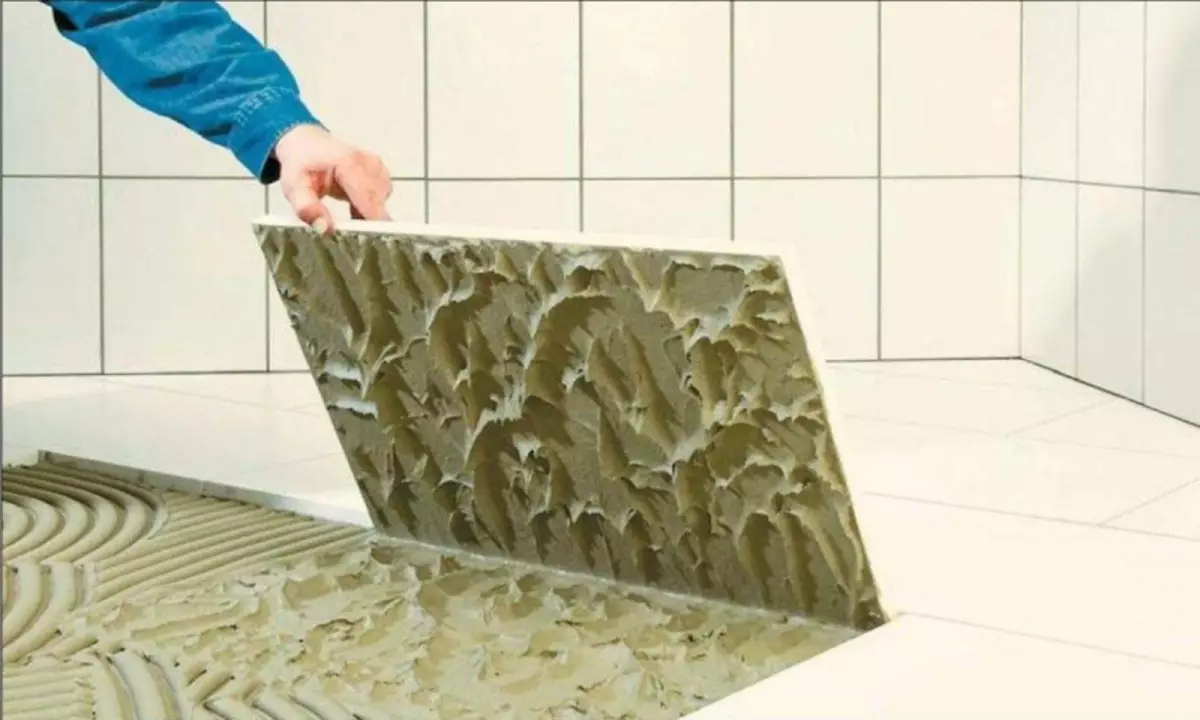
Before starting to lay a porcelain stoneware, it is necessary to correctly select the glue porcelain stoneware and popular tile coating, which is resistant to atmospheric and chemical influence. In addition, this material has excellent mechanical strength and dense structure with excellent water repellent property. It is at the expense of such characteristics, a tile of porcelain stoneware is in demand and ideal for both exterior and internal works. It is worth noting that the material will fully justify the expectations only if the installation is properly carried out and the tile glue is carefully selected.
Selection of glue for porcelain stoneware: what makeup is better
Due to the fact that the pores are used in a wide variety of areas, for example, indoors, outside, for finishing walls and stairs, various adhesive composition can be used, which is selected for a number of certain criteria.

Choosing adhesive for styling porcelain, it is necessary to take into account its mechanical strength, moisture resistance and heat resistance
It is not difficult to glue a porcelain barrel tile among themselves, since you just need to find the glue composition, which should be:
- Mechanical strength;
- Heat resistance;
- Moisture resistance;
- Increased strength, which is especially important when working with large canvas, since the porcelain stoneware is far from small weight and it is necessary to choose a solution that can withstand it for a long time.
It is important to note that the ceramic tile has the same properties, but the solution to which it must be glued, differs by properties, cost and purpose. It comes on sale 3 main types of glue, choose which can be described, reviews and recommendations of the specialist. One-component is a ready-made composition for laying tiles. It looks like a peculiar mastic that you can put on the wall right after the purchase.
The solution has elasticity, but dries for a long time.
Two-component, or, in other words? The polyurethane composition is made on an epoxy basis. You can glue the tile if the process is carried out with a mixture made on the basis of such a substance as Portland cement. In addition to him, the plasticizer comes to the canvas is an elasticity. Drying time is much longer than a mixture of sand and cement, but it can be used for premises with sharp temperature differences and high humidity.
Article on the topic: Shade do it yourself
Best tile glue for porcelain stoneware
Many do not understand why it is better to use a special adhesive composition for porcelain stoneware, and not ancient ways? The essence lies in the fact that the porcelain is low porosity, as well as the minimum level of water absorption.

You can familiarize yourself with the options for glue for porcelain books in specialized stores
The glue should be:
- Adhesion of the highest level;
- Increased plasticity, which allows for about 20 minutes to adjust the location of the tile, for more accurate installation;
- Frost resistance so that work can be carried out on the street;
- Moisture resistance;
- Environmental friendliness;
- Ease of installation;
- Versatility;
- Possibility of laying on a warm floor.
It is water absorption that is a stumbling block when the adhesive solution is selected, since the cement composition cannot be absorbed into the coverage of porcelain stoneware, which causes the formation of voids and reduces the operation of the coating. For laying a porcelain stoneware, you need to choose a special glue with certain properties that differ significantly different from cement-sand composition.
Suitable camraffic adhesive for a warm floor
The best adhesive for porcelain tiles, regardless of its size, for example, 600x600 or 30x30 cm, is the one that allows you to work quickly, efficiently and without mist. For sale glue for tiles from porcelain stoneware in 2 kinds: dry and ready. In dry, the highest quality cement is used with additional modifying components, and to use it, you need to dilute with water, in accordance with the instructions from the manufacturer.
Experts recommend using universal compositions, since they are much easier to work with them and there is an opportunity to put the composition on any system of warm floors, regardless of their type.

There are two types of glue for laying a porcelain stoneware, choose which should be tailored to the quality and composition of the porcelain tile
The finished mixture is made on the basis of epoxy resin and polyurethane, and before use, water is not required. The rating of adhesive compositions is very large, but it is advisable to first pay attention to the difference between the mixtures of the composition, which may affect their purpose.
Article on the topic: How to hang mirror on the wall, wardrobe
Characteristics:
- Elastic glue on a dispersion basis is used when mounting a tile from a small porcelain stoneware. An acrylic is used for manufacture, and it contains a modifier and artificial resin. The composition has excellent adhesion, but it is preferable to apply it to finish the walls, as it is applied with a thin layer and not suitable for heating.
- The adhesive of the reactive type (for example, Axton) based on polyurethane and epoxy resin is sold as 2 components that are mixed with direct use. Stirring is carried out as carefully as possible. The composition has excellent adhesive properties and at the same time resistant to temperature fluctuations, which allows it to be used for warm floors.
- There is a universal composition, which is intended for the floor and for this is used cement base. The filler is Portland cement. Due to the addition of fine sand, an astringent effect is created, and the modifying component adds it elasticity, increasing adhesion and strength. It is this composition perfectly suited under the warm floor.
It is worth noting that when installing an electric or warm infrared floor, it is pre-before applying the composition to lay special leveling sheets and a substrate for a solution for metal. The same can be said about the warm floors of the tape type, since the direct effect of glue on the heating device will cause its destruction. Best of all, when purchasing glue, pay attention to the recommendations of the manufacturer and the composition and system of the warm floor. Only in this case, it is permissible to carry out work as high quality and without mistakes in the form of harming the expensive system of heating the floor surface.
Why do you need a frost-resistant glue for porcelain stoneware
The frost-resistant adhesive composition for porcelain tiles is significantly different from the ordinary cement mixture, since the standard composition of cement and sand cannot withstand strong temperature differences and too strong decrease. To spend work on the street, you will need to use a specialized adhesive composition.
Article on the topic: how to disassemble the mixer in the bathroom: instructions for beginners

Difficult characteristics and quality differs frost-resistant glue for porcelain stoneware
When it is elected, you need to pay attention to the features of the characteristics:
- Through glue, a solid layer should be created between the coating and the base, and it should also withstand a larger load.
- The composition should have a high level of resistance to moisture, otherwise, a solution after drying can be deformed at the first temperature drop.
- If it is assumed to lay porcelain stoneware conditions, then glue should be stability, both high and low temperatures.
- When laying a Russian production porrite, it is worth choosing a composition with a maximum level of frost resistance.
- The solution should be elastic so that the plates can be adjusted on the coating.
It is better not to purchase the composition of large parties, and each time, depending on the operating conditions, select the desired solution. Only in this case the attachment will be competent and without consequences, such as tile delay and coating deformation.
What to choose glue for porcelain stoneware (video)
Under installation work, it is necessary to be guided by the recommendations of the masters and pay attention to the labeling, which you can determine the level of glue's suitability for a specific type of tile and room.
